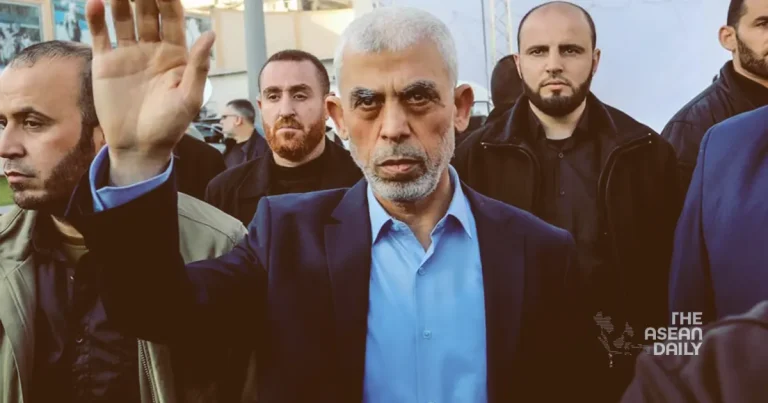7-8-2024 (CAIRO) In a bold move that signals an unwavering commitment to its radical stance, Hamas has named Yahya Sinwar, its formidable Gaza leader, as the successor to former political chief Ismail Haniyeh. The announcement, made on Tuesday, 6 August, comes in the wake of Haniyeh’s assassination in Tehran last week, an event that has further heightened tensions in the already volatile region.
Sinwar, widely regarded as the mastermind behind the devastating 7 October attack on Israel, has managed to elude Israeli attempts on his life since the outbreak of the war. His appointment to the top political position within Hamas is seen as a clear message of defiance and resilience.
“The Islamic Resistance Movement Hamas announces the selection of Commander Yahya Sinwar as the head of the political bureau of the movement, succeeding the martyr Commander Ismail Haniyeh, may Allah have mercy on him,” the group stated in a terse communiqué.
The news of Sinwar’s elevation was met with a barrage of rockets launched from Gaza, a stark reminder of the ongoing conflict that has ravaged the enclave for months. This show of force underscores the militant group’s determination to maintain its aggressive posture against Israel.
A regional diplomat familiar with the Egypt and Qatar-brokered negotiations aimed at ending the Gaza conflict and securing the release of 115 Israeli and foreign hostages, commented on the significance of this appointment. “It is a message of toughness and it is uncompromising,” the diplomat stated, adding, “The appointment means that Israel needs to face Sinwar over a solution to Gaza war.”
Sinwar’s background is steeped in conflict and resistance. Born in a refugee camp in Khan Younis, the 61-year-old spent half his adult life in Israeli prisons before his release in a prisoner exchange in 2011. His election as Hamas’ leader in Gaza in 2017 cemented his reputation as a hardline figure within the movement.
Israel’s military spokesman, Rear Admiral Daniel Hagari, reaffirmed the Israeli stance on Sinwar, holding him responsible for the 7 October attack and vowing to continue pursuing him. “There is only one place for Yahya Sinwar, and it is beside Mohammed Deif and the rest of the 7 October terrorists,” Hagari declared in a statement to Al-Arabiya television.
The appointment appears to have garnered widespread support within Hamas, with former leader Khaled Meshaal reportedly backing Sinwar “in loyalty to Gaza and its people, who are waging the battle of the Flood of Al-Aqsa”. This unity behind Sinwar’s leadership suggests a consolidated front within the movement.
For Israel, Sinwar’s appointment reinforces the view of Hamas as an implacable foe dedicated to its destruction. It is likely to bolster Prime Minister Benjamin Netanyahu’s resolve to continue the military campaign in Gaza until its objectives are met.
The ongoing conflict, now in its tenth month, has had devastating consequences. The surprise attack by Hamas-led fighters on 7 October resulted in approximately 1,200 Israeli and foreign casualties, with over 250 taken hostage. Israel’s retaliatory campaign has led to nearly 40,000 Palestinian deaths and left Gaza in ruins.
Despite the change in leadership, Hamas official Osama Hamdan assured that the movement remains committed to reaching a deal, with the negotiation team continuing its work under Sinwar’s close supervision.
However, political analyst Hani Al-Masri from Ramallah views Sinwar’s appointment as a direct challenge to Israel. “As Sinwar manages the negotiations, he will manage the movement,” Al-Masri noted, emphasising that this move sends a clear message about Hamas’ adherence to Sinwar’s “extremist and resistant approach”.




